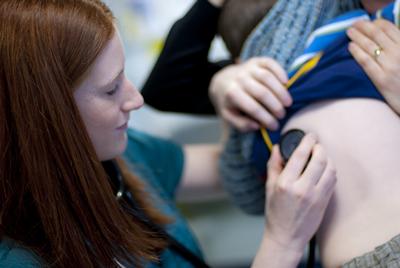Researchers find child appendicitis surgery ‘not needed’ in 75 per cent of cases

Researchers in Southampton have found surgery to treat a type of acute appendicitis in children could be unnecessary in more than three-quarters of cases.
In a landmark study, a team led by Nigel Hall, Associate Professor of Paediatric Surgery at the University of Southampton and a consultant paediatric surgeon at Southampton Children’s Hospital, found only 12 per cent of patients with an appendix mass developed recurrent appendicitis which required surgical intervention after receiving initial treatment with antibiotics.
Appendicitis causes the appendix – a small organ attached to the large intestine – to become inflamed due to a blockage or infection. It affects mainly children and teenagers and is the most common cause of emergency surgery in children.
Around one in 10 children develop a particular type of acute appendicitis called an appendix mass and are currently treated with initial non-operative management to clear infection followed by an operation to remove the appendix, known as an interval appendicectomy, to prevent recurrence.
"Most paediatric surgeons treat children who present acutely with an appendix mass non-operatively, however, up until now more than two-thirds of surgeons were routinely recommending interval appendicectomy, yet the justification for this surgical intervention has never been prospectively challenged," explained Mr Hall.
"A systematic review of retrospective studies suggested the incidence of recurrent appendicitis was approximately 20 per cent, but we have shown that figure is much lower. This calls into question the justification for surgery as standard practice."
The researchers studied 102 children aged between three and 15 years old across 17 specialist centres in the UK, one in Sweden and one in New Zealand, with 50 patients assigned to interval appendicectomy and 52 for active observation without surgery between 2011 and 2014.
In addition to showing more than 75 per cent of children avoided appendicectomy following non-operative medical management, the findings, published in The Lancet Gastroenterology and Hepatology, also highlighted severe complications related to interval appendicectomy occurred in 6 per cent of patients compared to an incidence of 3 per cent recorded in previous studies.
"After successful non-operative treatment, present surgical dogma is that interval appendicectomy should be done to avoid future recurrence of acute appendicitis," said Mr Hall.
"But, although the risk of complications after interval appendicectomy is low, they can be severe."
He added: "Adoption of a wait-and-see approach, reserving appendicectomy for those who develop recurrence or recurrent symptoms, results in fewer days in hospital, fewer days away from normal daily activity and is cheaper than routine interval appendicectomy.
"This study will allow clinicians, parents and children to make an evidence-based decision regarding the justification for interval appendicectomy and, in many cases, remove the need for surgery completely."